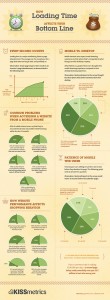As a business owner, you're likely used to audits of some kind. This might mean…
How is Loading Time Affecting Your Website?
When a potential customer clicks on a page in the list of search results, they have expectations that the content of the page will load fast and to completion without any hang-ups. As a matter of fact, 47% of consumers expect a web page to load in 2 seconds or less and 40% will abandon a website that takes more than 3 seconds to load. This puts some pressure on companies to not only have an impressive website, but one that loads fast enough to keep the average internet user engaged.
Google has also publicly announced that not only will site loading speed have a direct effect on a user’s experience, but it will also impact the website’s ranking. Slower sites have a higher bounce rate, or percentage of users who leave a website after viewing just one page, and in turn should earn a lower ranking, according to Google. Now, within good reason, speed is important to Google’s algorithms, but that does not negate the importance of meaningful content; your website still needs to be plentiful, but in a more organized manner.
Certain aspects to consider when trying to improve site load speed include choosing the right web host, proper website coding, image size, and the domain name system (DNS) server you use. Having a web host with a server that experiences a lot of down time, or large, incorrectly formatted images can negatively impact a website’s page load time and affect the overall site speed.
It is also important to make sure that your website is not only quick to load on a desktop but on mobile devices as well. A high percentage of internet users even expect pages to load just as fast, if not faster on their mobile device compared to a desktop.
If you are worried about your website’s load time, call i3 today and let us find ways to make your site faster.





Comments (0)